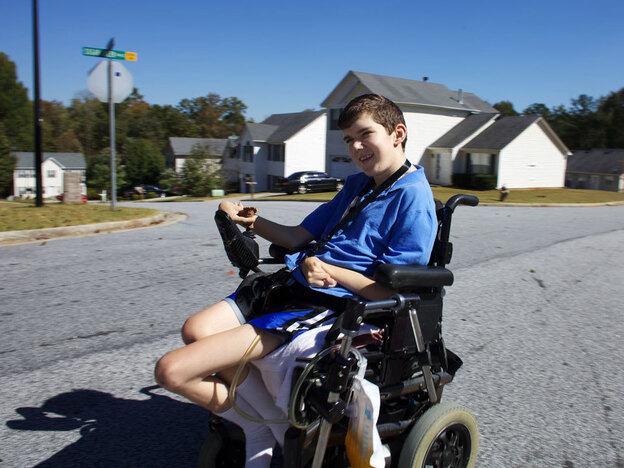The following is an article from NPR:
What do you think - Should a 22 year old be living in a Nursing Home???
After a year in a nursing home, Mathew Harp got his wish and moved out. He now lives in an Atlanta neighborhood with a woman who provides his attendant care.Click "read more" to read article
December 9, 2010
In a hotel ballroom outside Atlanta, a young man glides his wheelchair to the front of the meeting room. With his twisted hand he hits a button on a small gray box attached to the front of the chair and a machine speaks for him.
"I am Mathew Harp, and I am 22 years old."
The voice from the machine is crisp, modulated and not too mechanical. Harp has a muscle disorder and cannot speak, so he types his speech into the machine.
"I have a lot of special needs," he says, "and when I was 21 years old, I had to move into a nursing home because my mother and my sisters could not take care of me by themselves any longer."
Picture a nursing home and you think of a place for the elderly. But yearly federal nursing home data shows that there are more than 6,000 young people up to the age of 21 living in American nursing homes. And there are thousands more who are in their early 20s.
This spring, Harp gave a speech to a group of Georgia parents whose children are living in nursing facilities. It was part of the Children's Freedom Initiative, an effort by a group of Georgia disability advocates to track down every child in the state living in a nursing home and show their parents alternatives to nursing-home placement.
For Harp, the nursing home was an unhappy place.
"I was the youngest person in the nursing home. Most of the others were very old. I had only a few friends that would come and see me. I missed everyone very much," he says. "And I wanted to leave. I wanted to live with my family so that I would not miss them so much."
After a year in the nursing home, Harp got his wish and, in March, he moved back into his mother's home. That was possible because a state and federal program paid for the aides who come to his house nine hours every day. They help him get up, get dressed and eat.
Money from another program called Money Follows the Person paid to renovate his mother's rented house to make it more accessible for Harp. It even paid for the new concrete sidewalk outside so he can maneuver his wheelchair out of the house and into his mother's van. (A few months later, he used his new ability to choose where he wanted to live and moved into the house of the woman who provides his attendant care.)
Harp's speech was followed the next day by a van tour also organized by the Children's Freedom Initiative to showcase alternatives to long-term care in a nursing home.
"Today I hope that the families will just be able to develop a vision for what's possible for their children to live a life in the community," Katie Chandler says before the tour. She works for the Georgia Advocacy Office, a disability legal group, and as part of her advocacy, helped start the Children's Freedom Initiative.
Chandler tracked down more than 80 children and young adults from Georgia who live in state hospitals and nursing homes and then invited some of their parents on the tour. She told the parents that even children with the most severe disabilities can get good — and even better — care outside of a nursing home.
Chandler says someone who needs 24-hour care may not actually be getting that in a nursing home; the person may be seeing an actual nurse only 15 minutes a day.
"So what you're really getting is CNA care, the certified nursing assistant," she says. "They help you with your physical needs [getting in and out of a wheelchair, bathing and eating] and that can easily be done in the community."
The van tour visited a group home, a family who cares for their son with state-paid nurses in their own home, and an adult foster home.
information found at: http://www.npr.org/2010/12/09/131916238/youth-in-nursing-homes-seek-alternative-care

No comments:
Post a Comment